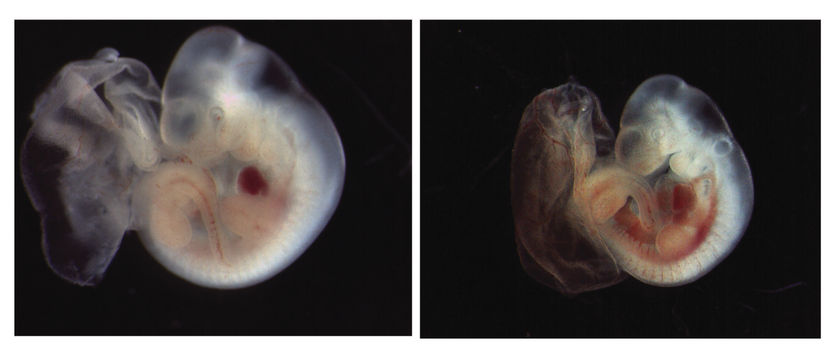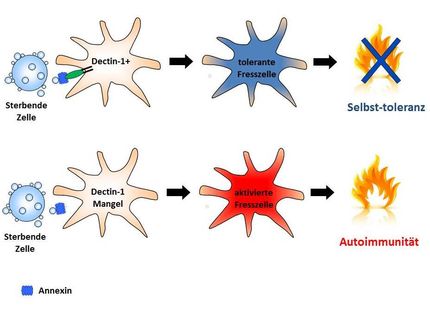Insights into a versatile molecular death switch
The enzyme caspase-8 regulates different modes of cell death
The enzyme caspase-8 induces a molecular cell death programme called pyroptosis without involving its enzymatic activity, a new study by Hamid Kashkar published in Nature shows. In order to safeguard healthy and functioning tissues, cells utilize different cell death mechanisms to dispose of unwanted cells (e.g. infected or aged cells). apoptosis is a ‘cellular suicide programme’ that does not cause tissue injury and is induced by caspase-8. necroptosis is another mode of regulated cell death which causes cellular damage and is normally engaged when caspase-8 is inhibited. Pyroptosis describes an inflammatory mode of regulated cellular death process, which is normally activated in response to microbial pathogens and is central for mounting anti-microbial immunity. Hamid Kashkar and his team have now shown that caspase-8 not only controls apoptosis and necroptosis but pyroptosis as well.

Pictures shows a wild type embryo on the left and an expressing inactive Caspase-8 (right).
CECAD
The research team studied the biological roles of caspase-8 in cell cultures and mice. Kashkar’s group showed that the enzymatic activity of caspase-8 is required to inhibit pyroptosis. ’We found out that the expression of inactive caspase-8 causes embryonic lethality and inflammatory tissue destruction. This could only be restored when necropto¬¬sis and pyroptosis were simultaneously blocked,’ Hamid Kashkar explains. The lack of caspase-8 enzymatic activity primarily causes necroptotic cell death. Interestingly, when necroptosis is blocked, the inactive caspase-8 serves as a protein scaffold for the formation of a signalling protein complex called inflammasome, which ultimately induces pyroptosis. ‘Microbial pathogens are heavily reliant on the fate of infected cells and have evolved a number of strategies to inhibit apoptosis and necroptosis,’ Hamid Kashkar adds.
The current study hypothesises that these strategies may have driven the counter-evolution of pyroptosis to secure cellular death as a host defence mechanism. The caspase-8-mediated switch between different modes of cell death adds a critical layer to the plasticity of cell death-induced immunity, which is increasingly involved in aging-associated disorders.
Original publication
Melanie Fritsch, Saskia D. Günther, Robin Schwarzer, Marie-Christine Albert, Fabian Schorn, J. Paul Werthenbach, Lars M. Schiffmann, Neil Stair, Hannah Stocks, Jens M. Seeger, Mohamed Lamkanfi, Martin Krönke, Manolis Pasparakis & Hamid Kashkar; "Caspase-8 is the molecular switch for apoptosis, necroptosis and pyroptosis"; Nature; 2019
Most read news
Original publication
Melanie Fritsch, Saskia D. Günther, Robin Schwarzer, Marie-Christine Albert, Fabian Schorn, J. Paul Werthenbach, Lars M. Schiffmann, Neil Stair, Hannah Stocks, Jens M. Seeger, Mohamed Lamkanfi, Martin Krönke, Manolis Pasparakis & Hamid Kashkar; "Caspase-8 is the molecular switch for apoptosis, necroptosis and pyroptosis"; Nature; 2019
Organizations
Other news from the department science

Get the life science industry in your inbox
By submitting this form you agree that LUMITOS AG will send you the newsletter(s) selected above by email. Your data will not be passed on to third parties. Your data will be stored and processed in accordance with our data protection regulations. LUMITOS may contact you by email for the purpose of advertising or market and opinion surveys. You can revoke your consent at any time without giving reasons to LUMITOS AG, Ernst-Augustin-Str. 2, 12489 Berlin, Germany or by e-mail at revoke@lumitos.com with effect for the future. In addition, each email contains a link to unsubscribe from the corresponding newsletter.



















































